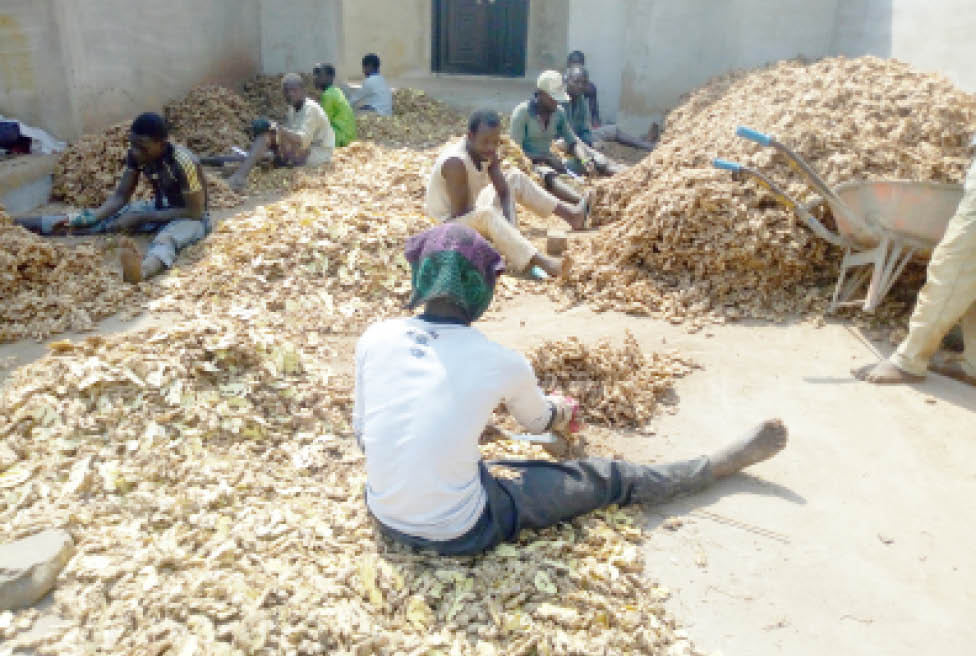Column No.6: When insecurity threatens ‘stomach infrastructure’
Across Nigeria, particularly the North, insecurity remains a serious problem. From insurgency in the North-East to banditry and kidnapping in other areas, no-one is spared by the deadly criminals. Granted, the problem is not new, but it appears to be heightening at the moment. Some states have it worse than others, regarding the terrorists we […]

Workers splinting ginger in Kagarko recently
Across Nigeria, particularly the North, insecurity remains a serious problem. From insurgency in the North-East to banditry and kidnapping in other areas, no-one is spared by the deadly criminals. Granted, the problem is not new, but it appears to be heightening at the moment. Some states have it worse than others, regarding the terrorists we seem to love to mis-name ‘bandits’ and ‘kidnappers’, even after some of them have been linked to known terror groups. However, in the affected states, one sector that appears to be the hardest-hit is the agricultural one.
In Niger State, many farmers have fled their farms to urban areas, vowing never to return until their safety is guaranteed. The bandits recently attacked farmers, in many operations that have affected roughly 20 local government areas of the state. Even communities that are yet to be attacked are dropping their proverbial hoes and fleeing to safer places, as they say it’s not a question of if the bandits will strike, but that of when. While you can’t blame them, the result of their flight has caused farms to be abandoned, triggering an increase in the prices of foodstuff nationwide.
The situation in Niger State also mirrors that of Kaduna, Benue, Kano, Plateau, Kebbi, and many others which are currently in the tight grip of the bandits. Farmers, many of them small-scale cultivators of staples like maize, millet, yams, beans, et cetera, expressed that while they are eager to return to their livelihoods, they cannot due to the abject fear which the ‘bandits’ have placed in their hearts via deadly attacks that include cold-blooded murder, kidnapping, rape, robbery, and arson.
Last year, when the problem began to come to light, some 5,000 agro rangers were taken from the Nigeria Security and Civil Defence Corps (NSCDC), as President Muhammadu Buhari announced during a 2020 national broadcast, calling it a move “to offer protection to farming investments across the country”. The NSCDC itself said the agro-rangers would protect farmers and their investments from incessant attacks by bandits. But why are Nigerians not hearing of or seeing the strides of these operatives? Do they have a scarcity of manpower, or are they underequipped? What are the problems they are facing? Perhaps the answers to these questions could help us find a solution.
While some state governments have assured farmers of steps to protect lives and property, other reports have also said some are engaging in special programmes in preparation for the coming planting season, to cushion the effect of transportation cost for agro input companies, and so on. But the question to ask is whether schemes or programmes will work if insecurity is not tackled. This is not a time for half-measures or PR stunts aiming for optics, but a time for decisive action, in providing adequate security, quashing groups of bandits, and identifying and arresting their collaborators.
Governors across affected areas appear overwhelmed, with all kinds of measures being tested to curb the menace, with varying results. The farmers themselves have reportedly resorted to striking a deal with the terrorists, which sees them paying a form of protection money, as well asa portion of their produce to be left alone, in a warped sort of truce that any sane society should do something about. But here we are today, shouting ourselves hoarse, pouring fuel on social media conjecture, wringing hands and doing nothing, as well as waiting on the government. A government which actually should do something, by the way!
So desperate I was for anything that offers a glimmer of hope, that when Vice President Yemi Osinbajo recently said the federal government is in the process of restructuring Nigeria’s security architecture, I almost did cartwheels. While it was somewhat reassuring to hear that, what would instil confidence in government would be actual action. That much-touted restructuring of our nation’s security architecture is needed if we are to secure our ‘stomach infrastructure’.
With farmers unable to go to their farms, the implication is that acute food insecurity will worsen, and grow into a larger economic problem for the states concerned and the nation in general. A most crucial sector, in its entirety, is endangered. It goes without saying that the federal government should, as a matter of emergency, come up with and execute a strategy that will mitigate this unfolding disaster that will affect not only every single Nigerian, but parts of Africa itself. Such a monumental humanitarian problem should not be allowed to happen.
